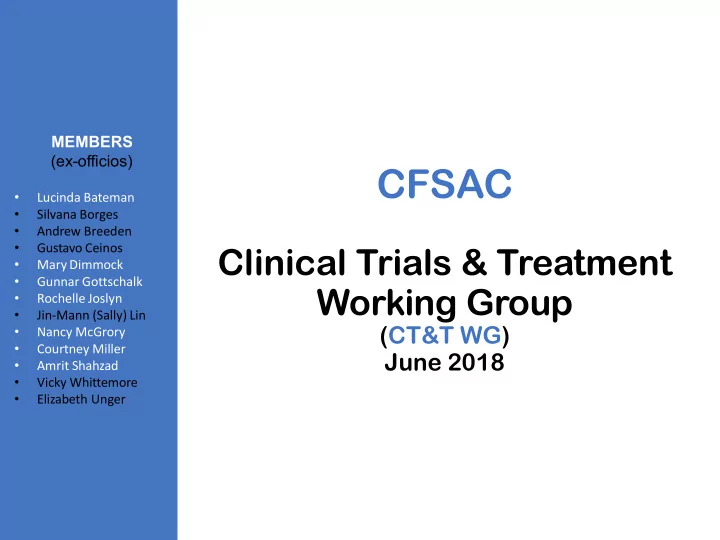

MEMBERS (ex-officios) CFSAC • Lucinda Bateman • Silvana Borges • Andrew Breeden • Clinical Trials & Treatment Gustavo Ceinos • Mary Dimmock • Gunnar Gottschalk Working Group • Rochelle Joslyn • Jin-Mann (Sally) Lin (CT&T WG) • Nancy McGrory • Courtney Miller June 2018 • Amrit Shahzad • Vicky Whittemore • Elizabeth Unger
CT&T Working Group MISSION • Identify barriers and challenges to developing drug treatments in ME/CFS and define ways to address them • Engage biopharmaceutical companies with drugs which can be tested in, or repurposed for, ME/CFS • Promote and facilitate clinical development of new and repurposed drugs TEAM • Uniquely positioned with ME/CFS knowledge, expertise, drug development experience, and agency representation • Strategic plan developed with members taking on tasks per their expertise and experience • Meeting held via conference call 2x every month CT&T Working Group 2
Strategic Plan Designed to Achieve Goals • Identify biopharmaceutical companies to engage • Drugs used in clinical trials for ME/CFS • Drugs used to treat adjacent diseases • Drugs for targets identified in clinical and preclinical work in ME/CFS • Identify and address hurdles to clinical development • Clinical trial challenges ‣ Diagnostic criteria, standard of care, diseaseprogression ‣ Patient subgroups, disease severity, inclusion/exclusion criteria, patient monitoring • Regulatory challenges ‣ Primary and secondary end points for efficacy ‣ Regulatory guidance document: Out reach to patient advocacy groups for other diseases and non profit companies regarding • Conference for industry executives, ME/CFS experts, experts from adjacent disease areas, and federal agency representatives Cross pollination of ideas between Industry and research community in ME/CFS andother • disease areas Consider treatment subgroup meetings where appropriate • CT&T Working Group 3
Identify Industry Partners: Progress ✓ Drugs used in clinical trials for ME/CFS • Literature review • Trials listed on Clinicaltrials.gov • Findings • Increase in published literature with a peak in 2015 • Largest category on published literature is neuromodulators with serotonergic drugs leading the category • Drugs of interest ‣ Ampligen : Small working group to understand issues related to clinical trial requirements for physician initiated trials by Dr. Peterson ‣ Rituxan : Team will engage with PIs running Rituxan clinical trial to understand reason for lack of efficacy in clinical trial. Start up company in CA with a modified CD20 molecule approached for possibility of clinical trials in ME/CFS ‣ Anakinra : Lack of efficacy in small trial. Anakinra requires daily administration, more potent anti-IL-1 agents can be explored. CT&T Working Group 4
Identify Industry Partners: Work in Progress • Anecdotal use of drugs by clinicians and patients • Data compiled from social media and other websites, analysis and follow up is in progress • Separately looking to extract data from treating physicians • Drugs used to treat adjacent diseases • Rationale based on disease symptoms and/or pathophysiology • Based on preliminary work:- ‣ Multiple Sclerosis: ✓ Tecfidera/Dimethylfumarate (Biogen) ✓ Ampyra/Fampridine (Acorda) ✓ Amantidine (Endo) ‣ Myasthenia Gravis ✓ Mestinon/Pyridostigmine (generic) • Drugs for targets identified in clinical and preclinical work in ME/CFS • Early stage of data collection CT&T Working Group 5
Few Significant Hurdles for Clinical Development Identified • Heterogeneity of disease symptoms • Identify ways to form patient subgroups • Sparse data on natural history of disease progression • Team is gathering data from MCAM and other studies • Work with agencies to understand the viability and need for an epidemiological study for ME/CFS • Clinical trial inconsistencies • Diagnostic criteria used • I/E criteria • Disease severity • Duration of treatment • Primary endpoint / patient outcome assessment • Patient monitoring (signs and symptoms, and labs) • Shrinking pool of ME/CFS treating clinicians CT&T Working Group 6
Regulatory Challenges to be Addressed • Regulatory guidance document requirements • Patient advocacy groups for other diseases e.g. Duchenne’s Muscular Dystrophy • Non profit companies who can help with regulatory strategy • Work with ex officios to define primary and secondary endpoints for efficacy • CDE vs. PROs (which can be used as approvable endpoints) • Get updates from research community for surrogate markers and/or biomarkers for efficacy • Validation required for monitoring devices • Understand CPET and it’s use in clinical trial • Engage expert clinicians and researchers for clinical trial and regulatory challenges CT&T Working Group 7
Conclusions • Capable and informed team with patients, patient advocates, researchers, treating physician and ex-officios at the table • Progress made in identifying potential treatment options, and some clinical trial challenges • A lot of work remains to be done to achieve goals set for the working group • Funding sources to be identified • Industry Engagement Summit in 4Q2018-1Q2019 • ~100 - 150K • Include ‣ Industry partners ‣ Physicians treating ME/CFS ‣ Researchers and clinicians in adjacent disease areas ‣ Federal agency representatives • Aim to have new clinical development in ME/CFS over next few years CT&T Working Group 8
Recommend
More recommend